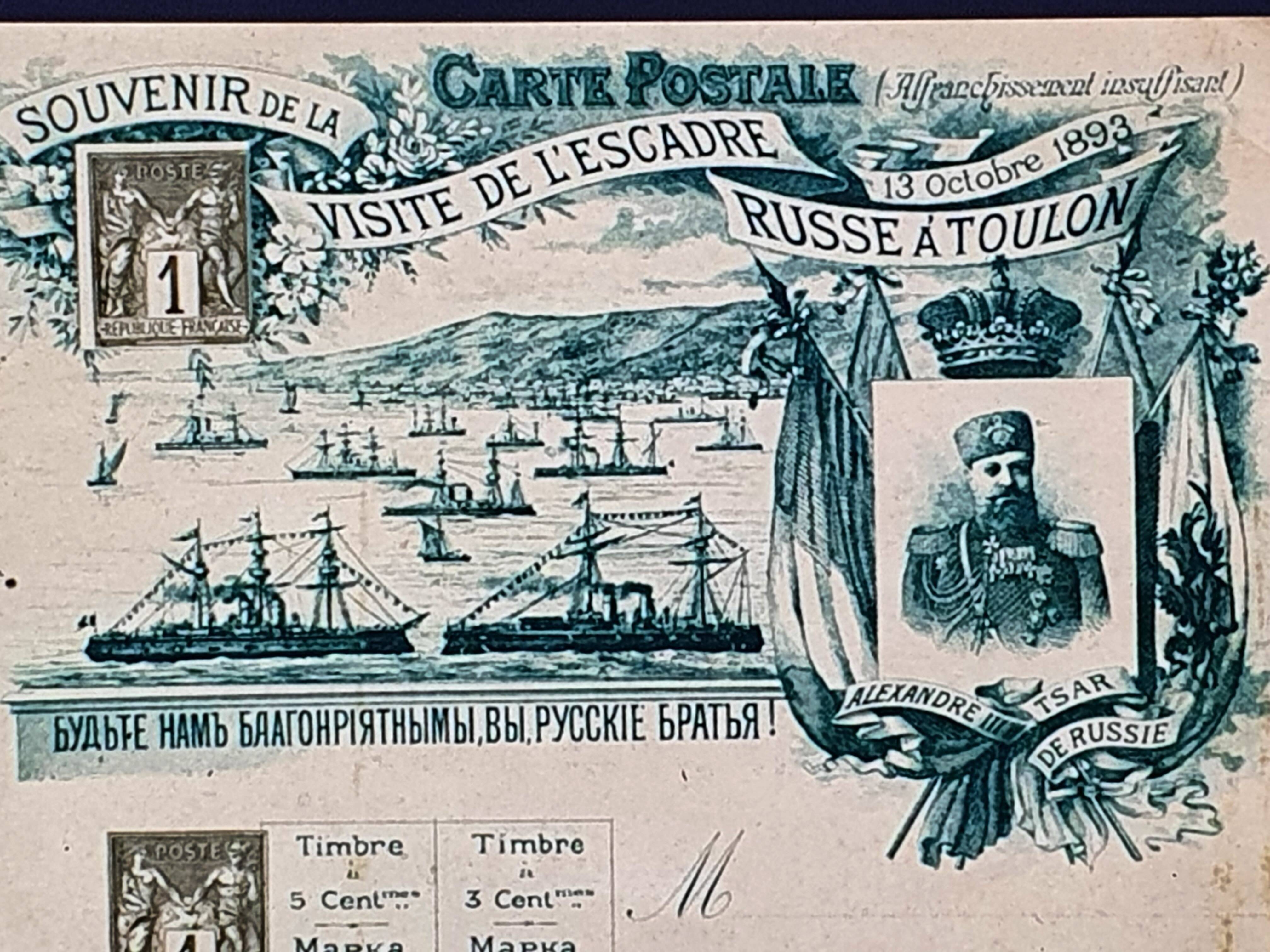Thus, in the early 1890s, relations between France and Russia were in good condition.
The two countries decided to unite, feeling isolated from the rest of Europe by the renewal of the Triple Alliance between Germany, Austria and Italy and the German refusal to extend its reassurance pact with Russia.
A Franco-Russian alliance was then signed in 1892. France wanted to obtain military guarantees to ensure its defense and Russia hoped to attract French capital to finance its industrialization. The famous Russian Loans were launched on the French market. They will last until 1913.
A week of celebrations in Toulon
Two major events will seal this alliance: the visit of the French fleet to Kronstadt in Russia in 1892 and the visit of the Russian fleet to the port of Toulon on 13 October 1893.
Toulon is celebrated for a week: paved streets, flower battles, shows, dinners, receptions, dances. The national and international press followed the event.
On October 13, at 8 in the morning, the already large crowd, massed along the port – whose main quay will be called Quai Cronstadt in memory of the event – saw a squadron of the French fleet composed of the cruiser Davout and several torpedo boats.
This goes to meet the Russian squadron which is located off the Grande Rade and which includes five buildings: the battleship Emperor Nicholas I on which is Admiral Avellan, commander of the Russian fleet, and the cruisers Pamyat–Azova, Amiral Nakhimov, Ryndaet Terez.
An hour later, the assembled Franco-Russian fleet entered the port. This time the crowd is estimated at two hundred thousand people. The jubilation is general. Everywhere applause, flags waving.
The little newspaper de Paris, which was the great magazine of the time, said: “At 9.30, at the entrance to the Grande Rade, the cruiser Davout greets the arrival of the Russian squadron with thirteen cannon shots. L’Emperor Nicholas I respond by doing the same. Then frenzied cheers break out on all the boats; on Davoutthe music plays the Russian national anthem while that of theEmperor Nicholas I he plays the Marseillaise … At the entrance to the Petite Rade, a considerable fleet has sprung up from all sides: steamers from Marseille, Nice, Cannes; foreign steamers, yachts from all over, fishing and pleasure boats, the “pointus” force of Toulon, steamboats by La Seyne. “
“It was like rumors of hurricanes coming out of this popular flow”
The Russian delegation dismounts. We admire these high-ranking soldiers, in black and gold uniforms, with imposing epaulettes and ceremonial tricorns, swords at the waist. The Russian delegation was welcomed by Rear Admirals Rocomaure, Major General, and Mac Guekin, Chief of Staff, who took it to the maritime prefecture where the Navy Minister, Admiral Rieunier, and the prefect, Admiral Vignes. Warm exchange of words of welcome.
We then meet in the town hall. In front of the building, whose balcony is supported by Puget’s Atlanteans, two tribunes have been erected on piers overflowing the water. Around the mayor of Toulon, Prosper Ferrero, a member of the French Workers’ Party, there were members of the municipal councils of Toulon and Paris.
Let’s open the great newspaper of the time Gallic : “The appearance of Admiral Avellan on the balcony, the enthusiasm was really unleashed. They were like hurricane voices coming out of this popular wave, and I let you imagine the frenzy with which men and women, inhabitants of Toulon and foreigners, waved hats, handkerchiefs and all the rest. The spectacle was impressive. “My dear friends, long live France!” Those six words alone were worth the longest speeches. The enthusiasm became delirium, the acclamation became thunder. “
Promises of eternal friendship and collaboration …
During a dinner in the salons of the maritime prefecture, the Toulon writer Jean Aicard, a future member of the French Academy, read, with all the lyricism that characterizes him, a poem in which he begged God to keep the Tsar in his desire for peace.
For a week the outbursts of celebration spread throughout the department: La Seyne, of course, where the shipyards for the Russian fleet worked, but also Hyères, Bandol, Ollioules. The chronicle of the time involved a large reception at the Astros castle in Vidauban, organized by the widow of the deputy Élysée Reynard, then 86 years old. The Russian fleet left Toulon on 30 October. We hugged each other warmly, waved handkerchiefs and exchanged promises of friendship and eternal collaboration between France and Russia …
Pickpockets and price increases
As we know, all sides have their downsides. The reception of the Russian fleet in Toulon, on October 13, 1893, also had its own. Just read the press of the time.
In Gallic from Paris: “Pickpockets appeared in number. Fifteen of them, including several foreigners, were caught red-handed as the crowd cheered Admiral Avellan at the town hall.”
In La Seyne’s diary: “The general increase in the cost of living due to these holidays and the influx of people has been remarkable. Here are some figures: in the butcher’s shop beef has risen to 1 franc and 1.40 francs per kilo, pork to 1 franc, the sausage at 1.40 francs and veal at 1.50 francs, as for the other cuts they cost 1.20 francs, went up to 1.60 francs and 2 francs per kilo for lamb, the prices were 1.60 francs and even 2 francs per kilo.
There are several ways to take into account the great events that mark history.


